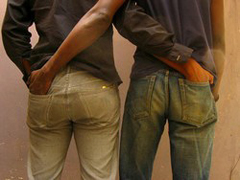Nilsa Hernandez, 62, used to work as an informal greengrocer in Venezuela to help increase her family income and provide for her children, grandchildren and great-grandchildren. As a person living with HIV for 16 years, Nilsa had managed to reduce her viral load to undetectable until everything changed suddenly when the political-economic crisis took hold in Venezuela. Health services were severely affected and people living with HIV gradually lost access to regular care, treatment and medication.
"I went about two years without access to treatment. My body started to feel the consequences and I realized that I needed to do something urgently. It was a live or die situation, and I decided to live!", remembers Nilsa.
Nilsa crossed the border and emigrated to Brazil, where HIV treatment is available to everyone through the public health system. It took her a year to prepare for the journey. In 2018, she arrived in Roraima, the Brazilian state bordering Venezuela, with her partner, who also lived with HIV, and her 12-year-old grandson.
They ended up in the streets after suffering all kinds of discrimination and violence. Thanks to the support of people she met, she finally managed to rent a small house in the outskirts of Rio Branco, the capital of Roraima, and resume her HIV treatment. As soon as she recovered immunity, she had no doubt: it was time to become an activist and create Valientes por la Vida (Brave for Life), a voluntary initiative to support other Venezuelans living with HIV who, like her, arrived in Brazil with scarce resources and little information.
"We are brave because it takes a lot of courage to leave your country, often with only the things we had to hand, in search of treatment and in search of life."
Today, as a humanitarian activist, Nilsa has mobilized a network of other Valientes who joined her to spread the word about the arrival of new Venezuelan migrants in search of HIV treatment.
The COVID-19 pandemic has severely affected this process, especially when the borders between Brazil and Venezuela were closed in March 2020. “The closure made it very difficult for my compatriots to access HIV treatment that could save their lives. With the reopening of the border, we are now putting these services back on track."
According to the 2020 Annual Report on Epidemiology issued by the state of Roraima’s medical authority, in the years 2018 and 2019, a combined total of 1,137 cases of HIV/AIDS were reported in the state. Among the foreign population, migrants from Venezuela represent the most significant number of the combined HIV/AIDS cases for the same period: 383 people.
Just like Nilsa, many of the Venezuelan people living with HIV migrate to Brazil in search of access to HIV treatment that they are no longer able to have in many parts of the country. In this context, UNAIDS established a partnership with UNESCO in December 2020 in a joint, collaborative and intersectoral strategy to grant Venezuelan migrants access to health education, prevention, and health promotion, and to support the responses of Roraima to HIV and COVID-19.
Claudia Velasquez, UNAIDS Representative and Country Director in Brazil, explains that the proposal is to reduce prejudice, stigma and discrimination related to migrants and refugees, and more vulnerable populations, such as sex workers and LGBTQIA+ population, youth and indigenous peoples.
"We want to promote the empowerment of vulnerable populations through the dissemination of information about HIV and the rights of people living with HIV”, says Ms. Velasquez. “Nilsa Hernandez is an example of a humanitarian activist. And people like her, who are Brave for Life, show the enormous impact that civil society's mobilization has on supporting and welcoming people living with HIV and on the efforts to face stigma and discrimination, which enhance the inequalities that prevent us from ending the AIDS pandemic by 2030."
For the future, Nilsa's dream is for Valientes por la Vida to become an international organization, with volunteers dedicated to supporting people living with HIV to have access to treatment and a healthy life. "I also want people to stop seeing us as HIV positive. This creates a horrible stigma that weighs on us all. We are not HIV positive. We are brave and impatient because we are in a hurry to live like everyone else."




